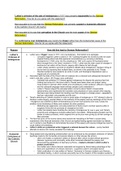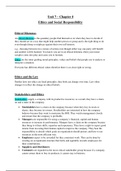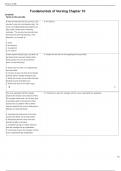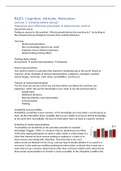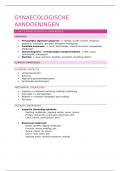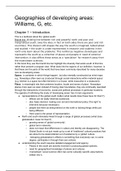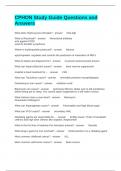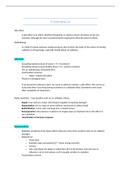Reformation.’ How far do you agree with this statement?
How accurate is it to say that the German Reformation was primarily caused by humanist criticisms
of the Catholic Church? (20 marks)
How accurate is it to say that corruption in the Church was the main cause of the German
Reformation?
The controversy over indulgences was merely the trigger rather than the fundamental cause of the
German Reformation. How far do you agree with this statement?
Reason How did this lead to German Reformation?
Luther’s ● Luther was a ‘trigger’ cause in 1517, not a revolutionary - first instinct is to apologise
Criticism of ○ corruption triggered Luther’s actions in 1517 (putting thoughts into words) but did not cause
Indulgences original thinking about sola fide (personal circumstances e.g. surviving a terrifying
thunderstorm in 1505, entry into the priesthood in 1507 and a period of theological study
which brought him to his ‘tower’ moment in 1516) - Luther was the main cause of changes in
doctrine but not reform of the Church, papacy still to blame for both though
○ Luther simply wanted to provoke an academic debate about indulgences, hoping to bring an
end to them by exposing their multiple flaws, as shown in the preamble to his Theses
○ Intended audience was academic as wrote in Latin, and theological disputations were a
regular part of university life
● Discontent with the state of the Church did not coalesce into a coherent and widespread demand for
reform until after Luther’s ‘95 Theses’ were published
○ Carlstadt had published 151 theses against indulgences for dispute the previous April but
nothing had come of it- this time Luther’s Theses were taken down and printed, being
mass-printed in German within weeks and circulating to a wide audience, difficult to suppress
and his colloquial language meant ordinary people could understand it
○ Luther’s Theses relayed the educated elite’s concerns about Tetzel’s irresponsible
salesmanship and expresseed the frustration and prejudices of many people when arguing
Germans were being tricked into handing over their savings to a foreign power - appealed to
German nationalists, anti-papalists and the poor
● Tetzel’s stretching of Catholic doctrine in order to boost sales of indulgences in 1517 allowed Luther to
develop a wide-ranging, popular attack on the authority of the papacy and key teachings of the Church
- indulgence was ordered by Albert of Brandenburg to be the most powerful ever sold, funded his
ambition to be Archbishop of Mainz and maintain his other positions
○ Marketing was aggressive, accusing audiences of being cruel to let their parents suffer in
purgatory if they did not purchase an indulgence for them
○ Luther had already been doubting the sincerity of indulgences for over a year, and Tetzel’s
proximity and outrageous promises added fuel to his beliefs - Wittenbergers flooded over the
border to make purchases, which angered him as the poor were giving up all their savings on
false premises
● The fact that some of the money raised went towards the rebuilding of St Peter’s caused deep
resentment of the financial demands of the Church and ignited feeling against domination by Italians -
Leo X wanted a new Basilica to demonstrate the power of the papacy and issuing indulgences was the
usual method of fundraising
● Luther’s skills as a polemical writer triggered a national demand for reform – poorly-handled
attempts to silence him merely escalated his challenge.
Humanist ● Deep-seated and long-standing anticlericalism can be evidenced by the persistent criticisms of Catholic
Criticisms of teachings made by the humanists and popular attacks on other abuses like simony
the Catholic ○ Ulrich von Hutten co-authored ‘Letters of Obscure Men’ which mocked clerical ignorance,
idleness, hypocrisy and immorality, while other humanists attacked the papacy and
Church
denounced the exploitation of Germany by Rome - created a climate in which Luther’s
protest could thrive
○ Von Hutten was a fierce German nationalist and angered by Rome taking advantage of the
fears and superstitions of ordinary Germans - supported Luther’s anti-papal stance
○ Celtis’ publication of a new edition of Tacitus’ ‘Germania’ in German created a pro-German,
anti-Italian feeling - Luther’s success was partly due to the creation of this receptive audience

